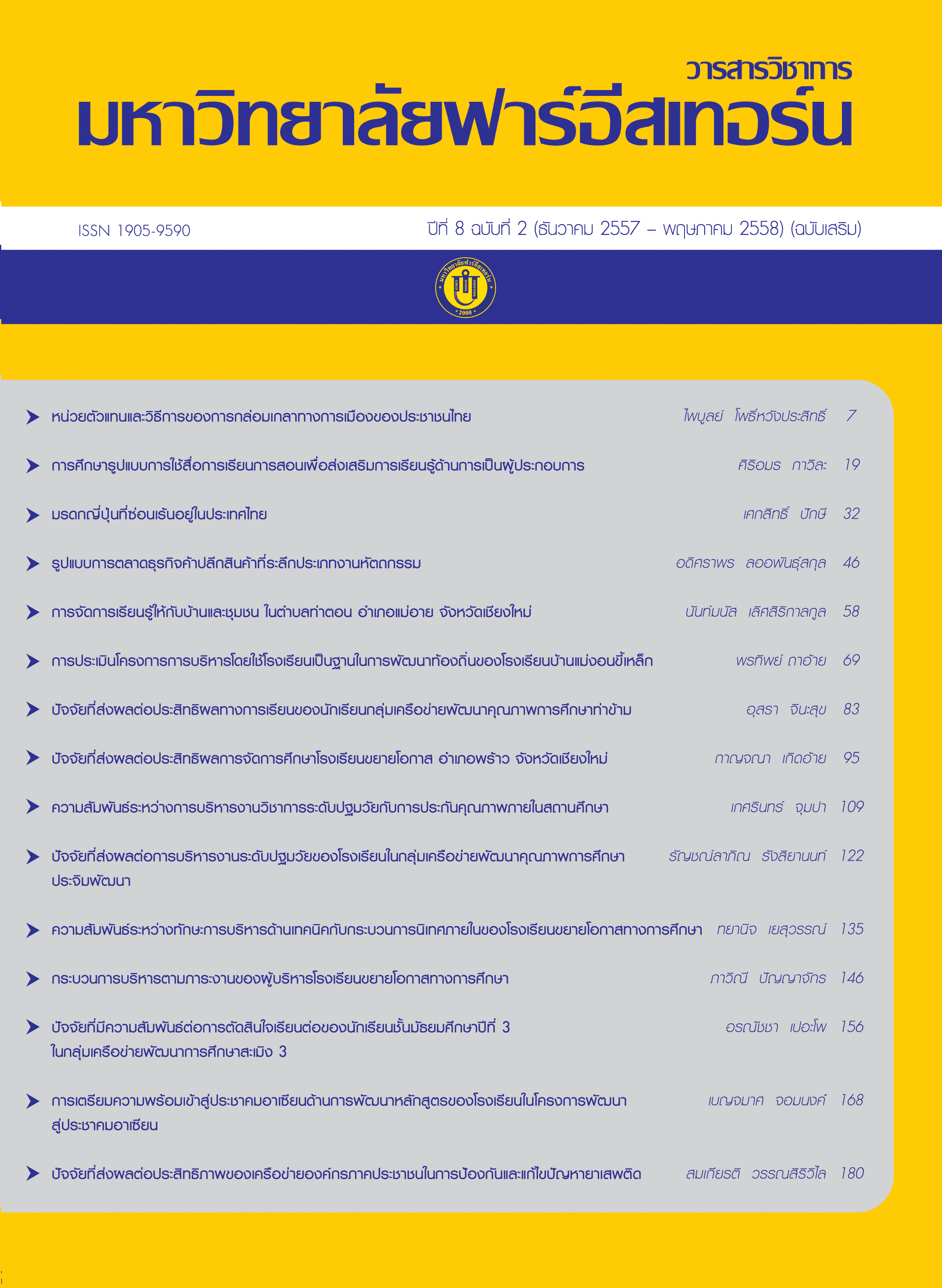กระบวนการบริหารตามภาระงานของผู้บริหารโรงเรียนขยายโอกาสทางการศึกษา อำเภอดอยเต่า จังหวัดเชียงใหม่
Main Article Content
Abstract
การวิจัยครั้งนี้มีวัตถุประสงค์เพื่อศึกษากระบวนการบริหารตามภาระงานของผู้บริหารโรงเรียนขยายโอกาสทางการศึกษา อำเภอดอยเต่า จังหวัดเชียงใหม่ ประชากรที่ใช้ในการวิจัย คือผู้บริหารและครูผู้สอนของโรงเรียนขยายโอกาสทางการศึกษา อำเภอดอยเต่า จังหวัดเชียงใหม่ ปีการศึกษา 2557 ประกอบด้วย ผู้บริหาร จำนวน 5 คน และครูผู้สอน จำนวน 72 คน รวมทั้งสิ้นจำนวน 77 คน เก็บรวบรวมข้อมูลโดยใช้แบบสอบถามและการสัมภาษณ์เชิงลึก วิเคราะห์ข้อมูลโดยใช้ความถี่ ร้อยละ ค่าเฉลี่ยและส่วนเบี่ยงเบนมาตรฐาน และการวิเคราะห์เนื้อหา ผลการวิจัยพบว่ากระบวนการบริหารตามภาระงานของผู้บริหารโรงเรียนขยายโอกาสทางการศึกษา อำเภอดอยเต่า จังหวัดเชียงใหม่ โดยแยกเป็นภาระงาน 4 ด้าน ได้แก่ ด้านการบริหารงานวิชาการ ด้านการบริหารงบประมาณ ด้านการบริหารงานบุคคล และด้านการบริหารงานทั่วไป พบว่าโดยรวมและรายด้านผู้บริหารและครูผู้สอนมีความคิดเห็นว่าผู้บริหารมีการนำกระบวนการตามแนวคิดของ Gregg มาใช้ในกระบวนการบริหารอยู่ในระดับมากทั้ง 7 ขั้นตอน คือ (1) การตัดสินใจสั่งการ (2) การวางแผน (3) การจัดองค์การ (4) การติดต่อสื่อสาร (5) การใช้อิทธิพลหรือการจูงใจ (6) การประสานงาน และ (7) การประเมินผล นอกจากนี้ ยังพบว่ากระบวนการจัดองค์การ เป็นกระบวนการที่มีค่าเฉลี่ยสูงสุด ซึ่งสอดคล้องกับการสัมภาษณ์ เชิงลึก กล่าวคือ กระบวนการจัดองค์การเป็นกระบวนการที่มีการนำมาใช้ในการบริหารตามภาระงานของผู้บริหาร เนื่องจากทุกโรงเรียนมีการจัดทำโครงสร้างของการบริหารงานตามนโยบายของสำนักงานเขตพื้นที่การศึกษาประถมศึกษาเชียงใหม่ เขต 5 ซึ่งมีการกำหนดหน้าที่ความรับผิดชอบของบุคลากรไว้เป็นลายลักษณ์อักษรอย่างชัดเจนโดยมีการมอบหมายงานตามความสามารถและความถนัดของบุคลากรส่วนขั้นตอนการประเมินผลเป็นขั้นตอนที่มีค่าเฉลี่ยต่ำสุด ซึ่งสอดคล้องกับการสัมภาษณ์เชิงลึก กล่าวคือ ขั้นตอนการประเมินผล เป็นขั้นตอนที่มีการนำมาใช้ในการดำเนินงานเป็นส่วนน้อย เพราะถึงแม้ว่าทางโรงเรียนจะมีนโยบายให้มีการประเมินผลทุกกิจกรรม แต่ในการปฏิบัติจริงกลับพบว่า บางกิจกรรมขาดการประเมินผล จึงทำให้ไม่มีข้อมูลที่จะนำมาปรับปรุงแก้ไข เพื่อนำไปใช้ในการวางแผนการจัดกิจกรรมครั้งต่อไปได้
This research aimed to investigate the administrative process based on the administrators’ tasks of the educational extended schools in Doi Tao District, Chiang Mai Province. The population used in this study was the administrators and the teachers of the educational extended schools in Doi Tao District, Chiang Mai Province in the academic year 2014 including 5 administrators and 72 teachers. There were totally 77 people. Data were collected by questionnaires and in-depth interviews. The data were analyzed through frequency, percentage, mean, standard deviation and a content analysis. The findings were as follows. The administrative process based on the administrators’ tasks of the educational opportunity extended schools in Doi Tao District were divided into 4 aspects including academic affair administration, budget management, personnel management and general administration. It was found that according to the overall and each aspect of the process, the administrators and the teachers agreed that the administrators applied the process based on Gregg's concept at high level in all of 7 steps consisting of (1) directing (2) planning (3) organizing (4) communicating (5) influencing or motivating (6) coordinating and (7) evaluating. In addition, it was found that the organizing process had the highest mean which corresponded to the in-depth interviews. The key persons stated that most of the organizing process was used for administrating based on the administrators’ tasks because all schools prepared the structures of administration based on the policy of the Primary Educational Service Office Area 5 determining the staff’s duties and responsibilities written clearly by assigning them to do their tasks according to their abilities as well as their aptitudes. However, the evaluation step had the lowest mean being consistent with the in-depth interviews. The key persons said that the evaluation pro was hardly used for operating since the schools had policies to evaluate all activities, it was found that some activities were not evaluated practically. Therefore, there was no information to be improved and used for planning the activity arrangement next time.
Article Details
1. Any views and comments in the Journal of Social Innovation and Lifelong Learning are the authors’ views. The editorial staff have not to agree with those views and it is not considered as the editorial’s responsibility.
2. The responsibility of content and draft check of each article belongs to each author. In case, there is any lawsuit about copyright infringement. It is considered as the authors’ sole responsibility.
3. The article copyright belonging to the authors and The Far Eastern University are copyrighted legally. Republication must be received direct permission from the authors and The Far Eastern University in written form.

